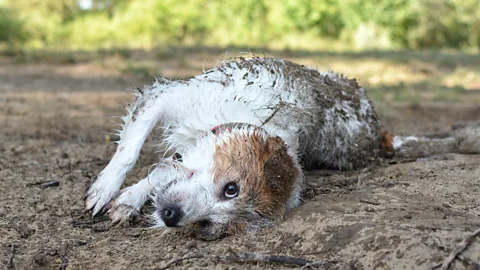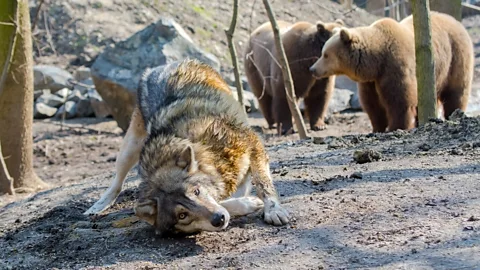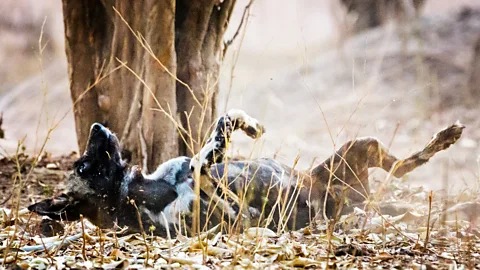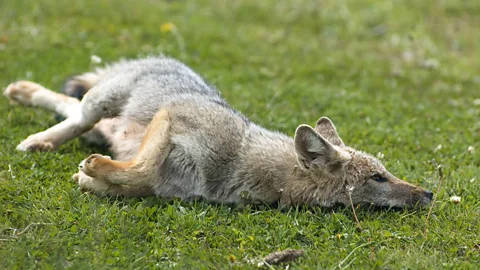Chanel No 2: The many reasons why dogs love to roll in poo
 Getty Images
Getty ImagesDogs have a baffling obsession with rolling in foul-smelling substances. It may be part of a form of communication we are only just starting to understand.
It would happen whenever Simon Gadbois took his border collie Zyla out on a research trip. They would be tracking the wild animals he studies in the rugged landscape of Nova Scotia, Canada, when Zyla would suddenly stop, nose to the ground. Before Gadbois could intervene, she would roll around enthusiastically. Then the smell would hit him.
"In case you have never smelt beaver poop before, it is horrible, really vile, and it stinks for weeks afterwards," he says.
Gadbois studies the behaviour of wild wolves, foxes and coyotes in Canada and had trained Zyla to help him find the animals. But for some baffling reason, she would also delight in rubbing herself in beaver excrement on these trips.
"It was always beyond me why she would do this," says Gadbois. "You would think it would interfere with her ability to smell and track other animals, but remarkably it did not affect her performance one bit."
It is a situation that will be familiar to most dog owners – your beloved pet comes bounding back to you reeking of a pungent, musky stench after rolling in something terrible. Gadbois has spent a large part of his career trying to understand how dogs and other members of the canid family of animals experience the world through their noses, yet even he is baffled by their behaviour at times.
One leading theory is that the predilection for smearing poo on their coats is simply an evolutionary hangover from their days as wild predators. If that’s the case, while we may have taught them to sit, stay and lie down, we apparently couldn’t suppress this stinky basic instinct.
"It may have had a very important function at some point a long time ago," says Gadbois. "Over time that function has vanished, but they still do it."
 Getty Images
Getty ImagesBut a study from 1986, where biologists observed scent-rubbing in two groups of captive wolves in Canada, may cast some doubt on this idea. The researchers provided the wolves with a range of different odours. Surprisingly, the wolves were least interested in rubbing themselves in the faeces of herbivores like sheep or horse, and the scientists did not see the animals rub on these odours at all. Food was similarly unappealing. Instead, their favoured scents were artificial odours like perfume or motor oil.
For an animal that might want to disguise its scent from its prey, choosing to smell like something so alien to their natural environment is surprising to say the least. However, the researchers also found that the wolves’ second favourite scent was the faeces of other carnivores like cougars and black bears.
Pat Goodmann, a senior animal curator at Wolf Park in Indiana who has spent many years studying scent-rolling in wolves, has noticed similar behaviour among the wolves she cares for. "Here at Wolf Park, the wolves are willing to roll in the scent of alien canids and domestic cats," she says. "It raises a strong possibility that wild wolves may roll in predator scent too. This would not be a helpful hunting disguise."
While wolves may occasionally hunt by ambush, they more commonly chase their prey down, which does not require nearly as much stealth, she adds.
So, could rolling in strong scents have another camouflage purpose? Rather than hiding them from prey, it might instead help smaller canids avoid other predators.
The idea might be supported by research published in 2016 by Max Allen, an ecologist who at the time was at the University of Wisconsin at Madison, and is now at the based at the University of Illinois Urbana-Champaign. With the help of remote cameras, he captured some unusual behaviour by grey foxes living around the Santa Cruz area of California.
The normally reclusive grey foxes were regularly visiting sites that male mountain lions used for scent-marking. The footage showed the foxes rubbing their cheeks on ground that had been freshly marked with strong-smelling urine by the mountain lions.
Allen believes the foxes are using the odour left by these large feline predators as a form of odour camouflage, to hide them from other large predators like coyotes.
"Coyotes are so much bigger than grey foxes but seem to want to eliminate them as there is competition for resources between them," says Allen. "The foxes cannot really fight back, so they are exploiting the puma scent to get some form of protection. Smelling like a puma might give them time to escape."
However, this does not explain why larger canids, like wolves, also rub themselves in the scent left by other predators. And it’s possible that male foxes are simply rubbing their head and neck on objects to leave their own scent behind – supported by the fact that they tend to have circumoral glands close to their mouths that secrete a grease-like substance.
When it comes to your pet dog, there could be a more social aspect to the behaviour: they might simply be trying to share an interesting scent with you. For animals that seem to experience so much of their world through their noses, it could be a useful way of sharing information with the rest of their pack in the wild.
Goodmann says her late colleague and founder of Wolf Park, Erich Klinghammer, proposed that scent rolling may be a form of what he called "non-insightful communication" where the wolves aren’t necessarily conscious of carrying scent to others on their fur. But she too has noticed that scent-rolling has an association with food.
"I watched our wolves eat up small pieces of elk. When they received a large side of elk, they both ate and scent rolled," says Goodmann. "I speculated that food scent on the wolf’s breath and on its fur indicated that there were more leftovers to scavenge, for wolves that wanted to backtrack to the source of the odour."
It is likely, however, there is a side to the smell-gathering behaviour we still struggle to understand. A study of wolves at a zoo in Croatia, for example, seems to indicate that rolling in odours may be part of more a complex form of communication about the world around them.
When presented with different sets of odours over a two-year period, the wolves seemed to be fairly selective about which scents they would roll in. While they spent a lot of time sniffing dung from herbivores such as deer and guinea pigs, it was unusual odours they hadn’t encountered before that triggered the most scent rolling behaviour, such as curry, rosemary and sheep’s wool. The researchers behind the study suggest the behaviour might be caused by encountering unfamiliar smells and a way of communicating with the rest of the pack.

 Getty Images
Getty ImagesGadbois believes, however, there may be a simpler explanation. In the wolf packs he studied in Canada, the lead animal tended to be the first to roll in a strong scent, followed by the others.
"It could be that this is about establishing a group odour," he says. "In the wolves I studied, if one started rubbing in something like a deer carcass, the whole pack would follow and rub in it. I’ve seen this in coyotes and foxes in the wild, too. It seems to become the odour you share with all the others in the group."
It supports the idea that pack animals such as wolves and dogs may use scent-rubbing as a way for an animal to ingratiate itself into a group. It could also be a way for pack animals to enhance their social position – by rolling in the scent of a more senior animal, higher status could literally rub off onto them.
A recent study led by Roberto Cazzolla Gatti, a biologist at the University of Bologna, Italy, has hinted at some more complex explanations. The work he and his colleagues have done suggests that wolves are able to recognise themselves through the smells they leave behind – a bit like looking in a kind of "olfactory mirror". The captive wolves his team studied never rolled in their own scent but did roll in odours from others in their group, non-companion wolves and a dog. But they also rolled in anise oil.
This seems to indicate that they are "aware of the ‘not me/other’ odours that they want to collect from their environment", says Cazzolla Gatti. "The scent-rolling behaviour might have multiple functions: mimicry, sociality, and identity," he adds.

 Getty Images
Getty ImagesOf course, it could be that the animals just enjoy rolling around in strong smells. One idea put forward by animal behaviour specialist Michael Fox in his 2007 book Dog Body, Dog Mind is that dogs might simply be collecting scents for pleasure, in the way humans dab on a spray of perfume. He suggests that a squirt of human perfume might also help to discourage a dog from seeking out unpleasant odours.
Dog psychologist Stanley Coren also agrees dogs could get a kick out of the olfactory stimulation from odours that smell obnoxious to our noses. He compares it to a "misbegotten sense of aesthetics" akin to humans wearing loud, colourful clothing.
Anyone who has watched their dog’s gleeful reaction after rubbing themselves in something disgusting will understand.
Certainly, parts of the brain associated with rewards light up in domestic dogs when they come across a smell they recognise, such as a familiar human, compared to an unfamiliar person. This could, of course, be a conditioned response brought about by the judicious application of treats.
Members of the dog family are also not the only animals to scent rub either – cats too are known to exhibit the behaviour. Most recently domestic pigs – another species with a highly developed sense of smell – were found to prefer rubbing themselves in plant-based oils compared to synthetic perfumes. But their underlying motivation also remains a mystery.
Sadly, it leaves us without a firm answer for why our dogs seem inextricably drawn to the faeces of other animals. It might just be because they are "poo-ches".
Sorry, that really does stink.
* This article is adapted from a story originally published by BBC Earth in 2017. It has been updated with the latest research.
Fuente: https://ift.tt/HZCorjK
Publicado: August 28, 2024 at 03:06AM
